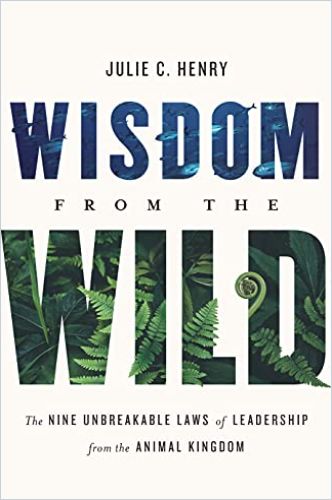Explorer Julie C. Henry details various animals’ habits to help you find your personal leadership style.

Lead Like an Animal
Explorer Julie C. Henry – president of Finish Line Leadership and a former zoo executive – believes leaders can improve their effectiveness by studying nature. She points out that animals don’t dither. They make quick visceral, innate judgments and move ahead with no wasted motions or emotions.
How blithe the throstle sings! / He, too, is no mean preacher: / Come forth into the light of things / Let Nature be your teacher. (William Wordsmith, The Tables Turned)
Leadership demands knowledge, purpose and a goal or destination, as well as the ability to promote and execute change. Nature offers many examples of such flexibility, teamwork and resilience. Henry draws nine leadership rules from the animal kingdom:
Law 1: “Change is constant, but it doesn’t have to be chaos.”
Three species of mangroves grow along South Florida’s shoreline. The red, white and black mangroves don’t compete for scarce resources. They work together to create a coastal ecosystem.
Nature has taught me to be a leader in ways that no textbook or mentor ever could.Julie C. Henry
Embrace the “Mangrove Method,” a flexible, four-stage process. Assess a situation, build a strategy to deal with it, commit to your course of action and communicate that course to your people. Learn to link these three phases together by observing the way mangroves assist each other.
Law 2: “If you’re distracted by fear, you’ll miss the opportunity.”
Often, fear will signal you to pause, reconnoiter and take advantage of fresh opportunities that may appear suddenly.Like all intelligent animals, when you feel afraid, you pay close attention to what’s ahead of you and adjust your actions as necessary. Nature often proves that you need not be afraid of whatever it was you initially feared.
Law 3: “When you can’t see the finish line, let purpose be your guide.”
Sea turtles date back to the time of the dinosaurs, more than 100 million years ago. A female sea turtle will swim for thousands of miles to find the perfect beach on which to lay her eggs. She will crawl up onto that special beach at night, search for the right nesting spot, use her flippers to dig deep into the sand and deposit her eggs. Female sea turtles possess an “instinctual compass” that enables them to fulfill this special purpose. Your quest may be difficult, but – as they demonstrate – your basic instincts will get you there.
Commitment and follow-through are the unsung heroes of leading change – the two aspects of a leader’s skill set that are most often assumed to be a given, but that are also the most often overlooked .Julie C. Henry
Instinct helps you meet life’s challenges. As soon as baby sea turtles emerge from the eggs their mothers buried on sandy beaches, they immediately waddle to the ocean and begin to swim. This is instinct, bravery and toughness in action. Leaders can learn from the turtles’ resilience and trust their human instincts when circumstances demand action.
Law 4: “There is no one-size-fits-all approach to teamwork.”
Consider which animal or animal traits resonate with you. Is it the determined sea turtle? The cooperative coral? The collaborative giraffe? To survive, wild animals and plants overcome challenges daily. Animals are natural leaders and, in many cases, natural team players that deal effectively with perplexing change and challenging circumstances.
Law 5: “Surround yourself with people who are not like you.”
In Africa, termites consume dead wood and plant material and release nutrients that fuel the growth of new trees, plants and grass. Large animals, such as giraffes, come to feed on this new growth and add the nutrients in their waste to the soil – which then supports additional plant growth, including more trees for them to dine upon in the future.
Nature is always teaching us – if we have the presence of mind to listen.Julie C. Henry
Even new trees eventually die, forming the dead wood that future termites will consume, thus continuing the eternal biological cycle. Termites and big herbivores, like giraffes, may not appear to be natural teammates – but they are. No species can survive without the other.
Law 6: “A team without a solid foundation is really just a group.”
Coral are marine invertebrates that join together to form colonies, or reefs, in tropical oceans. Working together, they form coral reefs, which sustain aquatic life.
Take notes from the animal kingdom about how to form teams. Recruit teammates with different skills who each contribute in their own ways to their group’s success.
Law 7: “Resilience is instinct inaction.”
Test, adapt adopt and apply the insights you gain from the wild, so they work for you as a leader.
Regard the leadership information you seek as a pyramid with knowledge at its base. That knowledge includes your existing skills, your “foundational understanding” and any new knowledge you gain in the future.
At your core, it is…instinctual knowledge that can guide your decisions and help you lead the way you were designed to leadJulie C. Henry
You are an animal, akin to the creatures of the wild, and like them, much of your knowledge is innate and instinctive. Henry contends that the insights and inspiration you seek are hardwired into your brain, along with your instinctual understanding of how the world works – this understanding forms your elemental essence as a functioning, intelligent and capable human animal.
Law 8: “You are wired not just to survive but to thrive.”
No mother sea turtle has to instruct her hatchlings to head out to sea after they’re born. No mother polar bear has to tell her cubs to watch her in order to learn how to hunt. They already know.
Dive into the natural world as you have never seen it – full of lessons on how to deal with change, work more effectively [and] build your resilience muscle.Julie C. Henry
Similarly, as a human animal, you possess instinctual, innate knowledge about leadership. However, you must be willing to accept the challenges of leading and to experiment with new ways of meeting those challenges.
Law 9: “Even cheetahs slow down.”
Cheetahs can reach speeds of 60 miles per hour and that requires vast expenditure of energy. After cheetahs chase and catch their meals, they rest to restore their energy. Recognize when you need to rest to restore your energy reserves.
This is a biological fact. All leaders, like all cheetahs, slow down at some point, whether by choice or by consequence. The fastest land animal in the world cannot run at top speed forever.Julie C. Henry
After the knowledge you amass, the lessons you learn from experience form the middle level of your information pyramid. As you learn from experience, you draw from what you’ve done and learned in the past and will learn and do in the future. Experience is a great teacher for people and animals. If you stay alert to what happens around you, experiential learning can convey life-changing lessons no class or coach could teach.
Wisdom is at the top of the information pyramid, but you cannot acquire it quickly. Wisdom is the payoff on your lifelong, committed and brave investment in learning. Wisdom emerges from substantial experience and purposeful reflection.
Whichever animals resonate with you, draw inspiration from them to shape your approach to leadership. The singular combination of your unique skills, hard work, wisdom, and instinctual, foundational or experiential knowledge will help you develop a method of leading that is yours alone and that fulfills your individual purpose.
Call of the Wild
Julie C. Henry has found a unique prism through which to study leadership and its ramifications. For readers who think they’ve read every possible angle on leadership, Henry provides a new one. However – and not to her detriment – she writes as if the animals she cites engage her more than the leadership questions she raises.
You can’t fool [Mother Nature]…she has a way of peeling back any pretense or unearned swagger you may bring outdoors, while also enveloping you in both challenges and joy.Julie C. Henry
Henry’s approach yields so many compelling descriptions of animal and plant behavior that you may find her attempts to connect those tales to leadership somewhat forced. And you won’t care because her animal stories are so fascinating. And while they may not illustrate leadership quite as clearly as Henry describes, they still prove illuminating and memorable.





